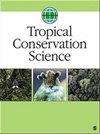智能森林难题:传感器和人工智能在热带森林保护科学中的陷阱
IF 1.6
4区 环境科学与生态学
Q2 BIODIVERSITY CONSERVATION
引用次数: 8
摘要
“智能森林”一词还不常见,但传感器、算法和以技术为中心的保护思维的激增,就像我们生活的大多数其他方面一样,表明我们正处于这种进化的边缘。虽然人们对使用智能技术在保护中的价值进行了一些批判性的讨论,但对使用大数据、传感器、人工智能和全球公司所涉及的更广泛的技术、社会和经济互动的全面讨论基本上是缺失的。在这里,我们探讨了随着森林逐渐转变为数据生产的技术场所,以优化生物多样性保护,并因此融入数字经济,值得考虑的陷阱。我们考虑谁是技术增强型森林的推动者,以及智能森林的逐步实施将如何影响传统的保护利益相关者。我们还研究了用传感器覆盖森林的影响以及将鼓励提出的问题类型。为了说明我们的论点,我们提供了我们在乌干达基巴莱国家公园工作的例子,该公园是非洲持续运行时间最长的研究实地站之一。本文章由计算机程序翻译,如有差异,请以英文原文为准。
The Smart Forest Conundrum: Contextualizing Pitfalls of Sensors and AI in Conservation Science for Tropical Forests
The term ‘smart forest’ is not yet common, but the proliferation of sensors, algorithms, and technocentric thinking in conservation, as in most other aspects of our lives, suggests we are at the brink of this evolution. While there has been some critical discussion about the value of using smart technology in conservation, a holistic discussion about the broader technological, social, and economic interactions involved with using big data, sensors, artificial intelligence, and global corporations is largely missing. Here, we explore the pitfalls that are useful to consider as forests are gradually converted to technological sites of data production for optimized biodiversity conservation and are consequently incorporated in the digital economy. We consider who are the enablers of the technologically enhanced forests and how the gradual operationalization of smart forests will impact the traditional stakeholders of conservation. We also look at the implications of carpeting forests with sensors and the type of questions that will be encouraged. To contextualize our arguments, we provide examples from our work in Kibale National Park, Uganda which hosts the one of the longest continuously running research field station in Africa.
求助全文
通过发布文献求助,成功后即可免费获取论文全文。
去求助
来源期刊

Tropical Conservation Science
BIODIVERSITY CONSERVATION-
CiteScore
3.60
自引率
5.90%
发文量
16
审稿时长
>12 weeks
期刊介绍:
Tropical Conservation Science is a peer-reviewed, open access journal that publishes original research papers and state-of-the-art reviews of broad interest to the field of conservation of tropical forests and of other tropical ecosystems.
 求助内容:
求助内容: 应助结果提醒方式:
应助结果提醒方式:


